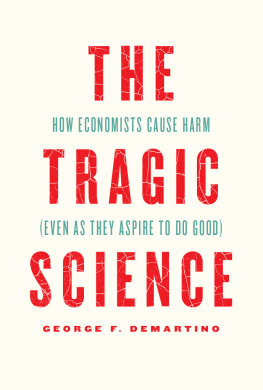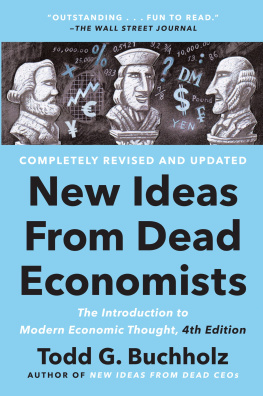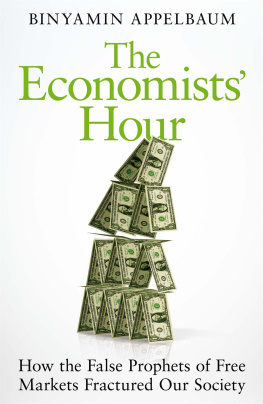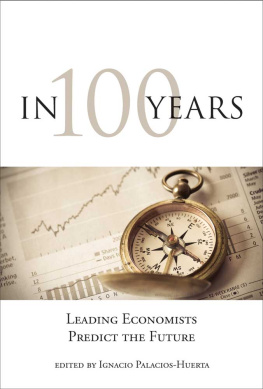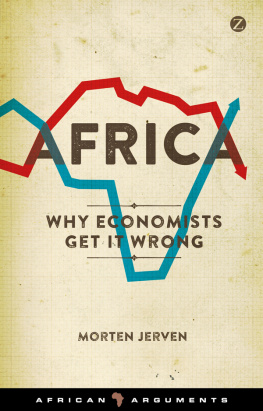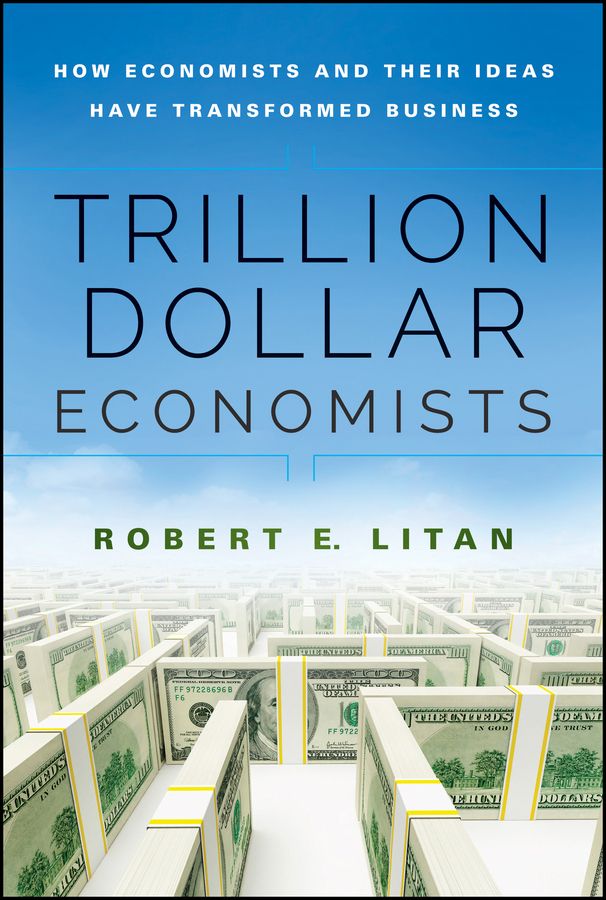
Contents
Pages
Guide
Since 1996, Bloomberg Press has published books for financial professionals, as well as books of general interest in investing, economics, current affairs, and policy affecting investors and business people. Titles are written by well-known practitioners, Bloomberg News reporters and columnists, and other leading authorities and journalists. Bloomberg Press books have been translated into more than 20 languages.
For a list of available titles, please visit our Web site at www.wiley.com/go/bloombergpress.
Trillion Dollar Economists
How Economists and Their Ideas Have Transformed Business
Robert E. Litan
Cover image: iStock.com/solvod
Cover design: Mochael J. Freeland
Copyright 2014 by Itzy. All rights reserved.
Published by John Wiley & Sons, Inc., Hoboken, New Jersey.
Published simultaneously in Canada.
No part of this publication may be reproduced, stored in a retrieval system, or transmitted in any form or by any means, electronic, mechanical, photocopying, recording, scanning, or otherwise, except as permitted under Section 107 or 108 of the 1976 United States Copyright Act, without either the prior written permission of the Publisher, or authorization through payment of the appropriate per-copy fee to the Copyright Clearance Center, Inc., 222 Rosewood Drive, Danvers, MA 01923, (978) 750-8400, fax (978) 646-8600, or on the Web at www.copyright.com. Requests to the Publisher for permission should be addressed to the Permissions Department, John Wiley & Sons, Inc., 111 River Street, Hoboken, NJ 07030, (201) 748-6011, fax (201) 748-6008, or online at http://www.wiley.com/go/permissions.
Limit of Liability/Disclaimer of Warranty: While the publisher and author have used their best efforts in preparing this book, they make no representations or warranties with respect to the accuracy or completeness of the contents of this book and specifically disclaim any implied warranties of merchantability or fitness for a particular purpose. No warranty may be created or extended by sales representatives or written sales materials. The advice and strategies contained herein may not be suitable for your situation. You should consult with a professional where appropriate. Neither the publisher nor author shall be liable for any loss of profit or any other commercial damages, including but not limited to special, incidental, consequential, or other damages.
For general information on our other products and services or for technical support, please contact our Customer Care Department within the United States at (800) 762-2974, outside the United States at (317) 572-3993 or fax (317) 572-4002.
Wiley publishes in a variety of print and electronic formats and by print-on-demand. Some material included with standard print versions of this book may not be included in e-books or in print-on-demand. If this book refers to media such as a CD or DVD that is not included in the version you purchased, you may download this material at http://booksupport.wiley.com. For more information about Wiley products, visit www.wiley.com.
Library of Congress Cataloging-in-Publication Data:
Litan, Robert E., 1950
Trillion dollar economists : how economists and their ideas have transformed business / Robert E. Litan.
pages cm
Includes index.
ISBN 978-1-118-78180-7 (hardback) 1. Decision making. 2. Economists. 3. Economics. 4. Commerce. I. Title.
HD30.23.L578 2014
338.5dc23
2014013664
Dedicated to
Dr. Michael Boyle
Johns Hopkins Medical School
and
Dr. Steven Stites
Kansas University Medical Center
Preface
Many, and possibly most, authors have a lovehate relationship with what they do. Writing every day, or trying to, can be a painful experience. Some days you have it and the words flow, and other days, your head is in a fog and you struggle to write a single sentence or paragraph.
I have had numerous jobs throughout my career where writing was not my main function, but in each one of them, writing memos, briefs, and articles was one element of what I was hired to do. I also had the good fortune through most of my working life to be employed by organizations that either paid me to write books or encouraged me to do so. And, to be honest, I have that lovehate attitude toward writing that I just described.
But not for this book; I wrote it while I was 63, at or near the culmination of my career, and every day I spent working on it was a joy. Like the swimming I look forward to each day, I couldnt wait to sit down for however long I was able to do it, and at least write a few paragraphs or, ideally, several pages.
Its not my age that explains this, but the subject matter (or matters), to be more precise. I hope that as you read the book, you can tell that I love economics and I am grateful to have a career in which I have been able to meet and occasionally work with so many outstanding, brilliant individuals. This book is kind of an ode to all of them and to the subject in general.
I got the inspiration to write it from three basic sources. First, I felt after the financial crisis that the economics profession, while somewhat justifiably criticized, was also misunderstood by many in the media and many non-economist friends. Second, for a long time I have felt that many hardheaded people in business give too little credit to economists and their ideas. Many of them, as I argue in what you are about to read, probably are not even aware of where certain ideas originated that have powered businesses quite successfully, maybe even their business. This book is an effort to correct these misimpressions, while ideally helping many undergraduate students and perhaps some graduate business students taking their first or intermediate-level economics course to understand why the subject matters and how it has been, and will continue to be, highly useful in the real world. This is true even as the field of economics changes and conceivably morphs into other social sciences, as I will comment on in the last chapter.
Third, although I dont know him, I want to credit Steven Leavitt, the award-winning economist at the University of Chicago, and his coauthor, Stephen Dubner, of the highly successful Freakonomics series, with demonstrating that there is a real market, maybe even a hunger, for books about economics in plain English. I was inspired by Leavitts and Dubners success and hope that this book will achieve at least some significant fraction of the attention and admiration that their books have.
No book can be completed without a lot of help from a lot of people. This work is no exception. I want to thank Rob Barnett, Barry Bosworth, Will Baumol, Patrick Driessen, George Kaufman, Richard Levine, Bruce Owen, Roger Noll, Chris Payne, Brian Rye, and Hal Varian for reviewing parts of the draft manuscript. I am indebted to my good friend Phil Auerswald for coming up with the title. I pride myself on coming up with titles for my own books and for others, but on this one Phil outdid me and for that I am grateful.
I am also grateful for the excellent initial drafting assistance in Chapters 5, 7, and 15 provided by Miguel Garrido, my close former colleague at Bloomberg Government. I also want to thank several others at Bloomberg: Dan Doctoroff, president and chief executive officer of Bloomberg, L.P., and Don Baptiste, head of Bloomberg Government, for their encouragement and support for this project, and Marialuisa Mendiola for providing research assistance. I also want to specially thank Norman Pearlstine, formerly chief content officer at Bloomberg and currently the chief content officer at Time, Inc., for reading the initial chapters of this book, and giving me his enthusiastic reaction that sustained me through the long months of drafting the rest of the book.
Next page

